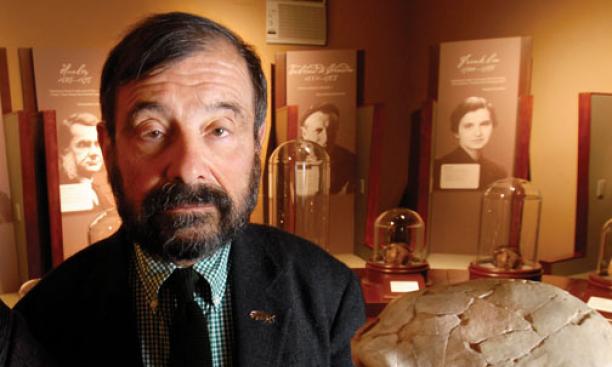

Evolution is a mechanism for function, not perfection, says Alan Mann, a Princeton professor of anthropology. So while our skulls have evolved to house larger brains, they also have lost the space needed for 32 teeth (and as a result, many of us now have wisdom teeth removed). And the human pelvis, which has evolved to support weight in bipedal locomotion, often inhibits childbirth. These imperfections and others are explored in “Surviving: The Body of Evidence,” an exhibit at the University of Pennsylvania Museum of Archaeology and Anthropology, curated by Mann and Janet Monge, a visiting professor at Princeton. The exhibit coincides with “Darwin Year,” an international celebration of Charles Darwin’s 200th birthday (Feb. 12) and the 150th anniversary of the publication of On the Origin of Species. It will remain on display in Philadelphia through May 3 and will travel to Cleveland, Houston, and Memphis in 2009 and 2010. Mann spoke with PAW in the fall.
The “Surviving” exhibit is drawn in large part from your Princeton course on human evolution. Why do you think the human body is an effective teaching tool?
Because we’re humans. ... A lot of people don’t understand exactly how evolution has influenced our own eventual emergence, and that’s why I want to look at us. I mean, it’s very nice to talk about fruit flies or Darwin’s finches or moths in England. But when you’re going to the dentist to have your [wisdom] teeth pulled ... or a woman has to have a Caesarian section because her pelvis is not broad enough — how can you understand that, within our own biological system? I don’t have all the answers. I can only put together the questions to be asked, and give the students an understanding of what it means to be part of this, to have an understanding of our place in an evolutionary world.
The exhibit is very tactile, giving visitors a chance to touch casts of fossils and bones. Can you explain what it is like to unearth and hold the real things?
There’s nothing like it. I can remember back in the ’60s, when I first went to Africa. I was given permission to pick up some of the skulls of our very earliest ancestors, a very primitive group known as the australopithecines. I was simply overwhelmed. I use this example with students: It’s almost like going to your grandparents’ house. You go up to the attic and open up this trunk, and you see these yellowing photographs of people in very bizarre clothes, standing in front of the 1939 World’s Fair or the 1893 World’s Columbian Exposition — and these are your ancestors. You’ve never met them. They’re all gone, they wore strange clothes and lived in ways that are very different from ours, but they’re your ancestors. Well, studying human evolution is like going into the attic of humankind, and looking at ancestors that are not two, three, five generations behind us, but 10,000 generations behind us.
In 2009, many institutions are celebrating “Darwin Year.” What impresses you about Darwin as a person and as a scientist?
What impresses me most about Darwin was his continual questioning of what he was doing. There’s an absolutely wonderful annotated book of how Darwin changed the wording and the text of On the Origin of Species from its first edition in 1859 almost until his death in 1882. What you see is that Darwin was acutely aware of the criticisms directed at the Origin, and when you read [versions of the book] and the changes that he made, you see that he was very thoughtful and understanding of the inadequacy of some of his explanations — and they were inadequate. One of the things that I admire is his ability to say, “This was wrong, I was wrong, let’s rethink this.”
How is an understanding of evolution useful to both scientists and nonscientists?
An evolutionary perspective becomes increasingly important as we damage our planet. There is, I think, a traditional notion that humanity has been given the right to use the planet as we wish — that we are somehow divorced from nature and the nonhuman community. An evolutionary perspective shows that to be completely untrue. We are, in fact, the product of evolution. We are part of the living world. We are an exceptionally special and unique species, but we are still part of this living world. I think a vision of our closeness to the rest of the world can only do us good. That’s one of the things that Darwin did: Darwin placed us firmly in the living world.
— Interview conducted and condensed by Brett Tomlinson
